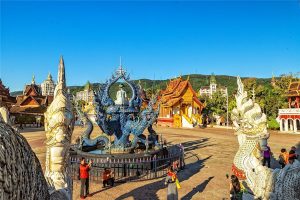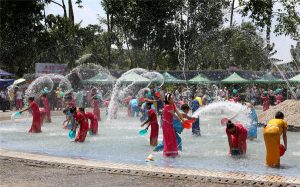
Interesting Placenames of Dai Ethnic Minority

There are innumerable placenames in Dai like “Xishuangbanna”. But their meanings are different from the literal Chinese characters, and we cannot interpret them superficially without real understanding. There is a doggerel about this: “There is no ‘long’ (dragon) in Menglong and Feilong, no ‘dao’ (island) in Nongdao and Bingdao, neither ‘jie’ (sister) in Jiegao and Jiexiang, neither city of stone in Nanjing.” In Dai, “long ” means big, so Menglong and Feilong means “big plain” and “big shade”; “dao” means lichen, so Nongdao and Bingdao means “the pool with lichen” and “the corner with lichen”; “jie” means town, so Jiegao and Jiexiang are respectively “old town” and “gem town”. In Zhenyuan County, Yunnan Province, there is a Nanjing village and a Nanjing street, and in Ruili County a Nanjing Li. Actually in Dai, “Nan” is river or water resource, “Jing” means to eat or drink, and “Li” means good. Therefore, “Nanjing” is a place with drinking water, while “Nanjing Li” is a place with good drinking water.
Dai YouthJinghong, the capital of Xishuangbanna, literally means the Town of Dawn: “Jing” is town and “Hong” is dawn. It was said that when Sakyamuni arrived there during his missionary traveling, it was at daybreak, with cocks crowing. So He gave the name “the Town of Dawn” to this place. Then Sakyamuni moved on, and came to today’s Zhuanghong Lu in Jinghong when it was breakfast time. Thus the street gets its name — “Zhuanghong Lu” is a placename composed of both Chinese and Dai; Zhuanghong is from Dai, meaning the first meal or breakfast, while “Lu” is from Chinese, meaning road. Then Sakyamuni crossed Mengyang and climbed up to Manpo of Jinuo Mountain, where he looked behind and found out that there was still a small piece of land he had not trod. So He cried out surprisedly “Meng Yang Nan!” – still a small piece of land! Thus the place gets the name of Mengyang or Little Mengyang. “Meng” means place, “Yang” means remaining, and “Nan” means small. The placenames above are all of Buddhism origin, from which we can see how the Dai people respect and worship Sakyamuni.

StaringSome other placenames are related to natural resources and environment. Mannonghan in Gadong District, means “the Golden Lake Stockaded Village”: “Man” means stockaded village, “Nong” lake, and “Han” gold. As it is said, there used to be a lake, where golden red deer often came to drink water. Thus it got the name. That reminds us of Payalawu chasing a golden deer to the mysterious Xishuangbanna. Maybe this is just the lake the deer had jumped into. Menghun, in Menghai County, means river having reversed its way. “Meng” means place while “Hun” means to reverse. There is a Nanhun River in Menghun County, which means river reversed its way. It is said that Nanhun River used to flow southeastward from Gelang River. When Sakyamuni travelled to the place, He pointed his staff to the west, and then the river reversed its flow to the west. So there are names of “Nanhun” and “Menghun”. Besides, Mengla means a place producing tea; Menglun means a place producing soft stone; Mohei means “salt well”, and Mozheng means “lead well”, ect.

 7 Days GolfingTour
7 Days GolfingTour
 8 Days Group Tour
8 Days Group Tour
 8 Days Yunnan Tour
8 Days Yunnan Tour
 7 Days Shangri La Hiking
7 Days Shangri La Hiking
 11 Days Yunnan Tour
11 Days Yunnan Tour
 6 Days Yuanyang Terraces
6 Days Yuanyang Terraces
 11 Days Yunnan Tour
11 Days Yunnan Tour
 8 Days South Yunnan
8 Days South Yunnan
 7 Days Tea Tour
7 Days Tea Tour
 8 Days Muslim Tour
8 Days Muslim Tour
 12 Days Self-Driving
12 Days Self-Driving
 4 Days Haba Climbing
4 Days Haba Climbing
 Tiger Leaping Gorge
Tiger Leaping Gorge
 Stone Forest
Stone Forest
 Yunnan-Tibet
Yunnan-Tibet
 Hani Rice Terraces
Hani Rice Terraces
 Kunming
Kunming
 Lijiang
Lijiang
 Shangri-la
Shangri-la
 Dali
Dali
 XishuangBanna
XishuangBanna
 Honghe
Honghe
 Kunming
Kunming
 Lijiang
Lijiang
 Shangri-la
Shangri-la
 Yuanyang Rice Terraces
Yuanyang Rice Terraces
 Nujiang
Nujiang
 XishuangBanna
XishuangBanna
 Spring City Golf
Spring City Golf
 Snow Mountain Golf
Snow Mountain Golf
 Stone Mountain Golf
Stone Mountain Golf


















